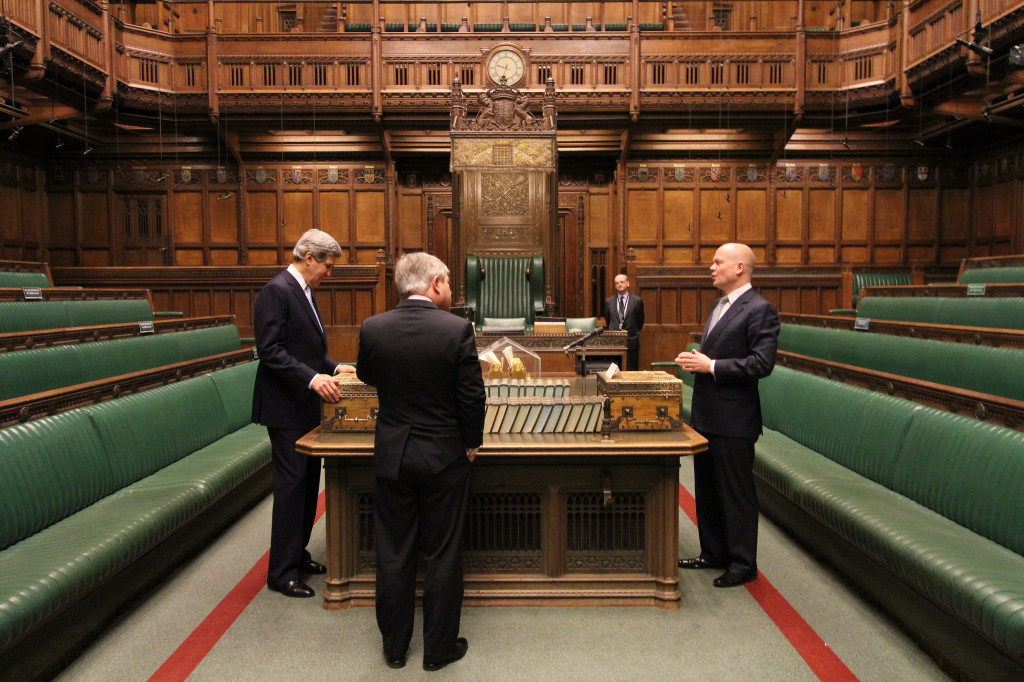Robust and partisan Parliamentary events like Prime Ministers Questions increase engagement with politics
Prime Minister’s Question time is often seen as representing the worst of British politics, with MPs regularly accused of acting like baying children in an attempt to intimidate their rival’s leader. But while this spectacle may be unedifying, Rob Salmond‘s research shows that PMQs and similar legislative sessions across the world increase engagement with politics because of their accessibility and excitement.

US Secretary of State John Kerry, Speaker Bercow, and William Hague MP in the House of Commons; US Government Work
Prime Minister’s Questions are the highest profile event in the British political week. Very similar dramas play out in Commonwealth countries like Canada and New Zealand, and other high profile question times take place in some European democracies but not others. The USA stands apart, having no regular opportunity for the legislature to question the Head of Government.
But for all the political sweat, TV grabs, and column-inches poured into PMQs, do they have any impact on the way the public interacts with politics and politicians?
Pro-democracy theatre
I recently published a paper in the Journal of Legislative Studies that provides a data-driven answer to this question. To do this, I observed the rules and the practice of question times across most of the world’s long-standing democracies, and compared those rules and practices against patterns of public opinion, as revealed in the Comparative Study of Electoral Systems.
What I found has novel implications for how we should view PMQs’ role in British democracy.
Question times with permissive rules about surprise questions and short, impromptu exchanges between partisan combatants increase public engagement with politics. PMQs fit this archetype very well. More spontaneous, combative question times are associated with higher levels of voter turnout, deeper partisan attachments, and higher levels of political knowledge. These relationships hold even when accounting for many other factors known to affect political engagement.
More “serious” question times, often featuring longer questions and answers that can all be prepared in advance, do relatively little to promote public political engagement.
People who want to promote public engagement with politics, therefore, should promote question time institutions that lead to unplanned, robust, partisan debate. Britain’s PMQs is among the world’s best models for achieving that goal, which may partly explain why question time reformers in countries ranging from Belgium to Japan have often references PMQs as the model to follow.
Looking outside the bubble
This finding might seem counter-intuitive to many readers of the Democratic Audit, because much of Britain’s political elite has derided PMQs as a farce that cheapens the democracy it purports to serve. Report after report has argued that the public despises the hyper-partisan spectacle of PMQs, and that survey respondents report PMQs are turning them away from politics altogether.
The problem with this perspective is it simply assumes all citizens think about politics the same way as political insiders. They don’t.
In recent years, a growing strand of research – my own included – has found that political spectacles, often taking forms that political elites find unorthodox or even distasteful, serve as useful mobilisers of the public-at-large. From 19th century torchlight parades to modern late night TV comedy to Oprah, populist presentations of public affairs create interest and action among sections of the community that are otherwise relatively inactive.
The theoretical underpinnings for these studies are pretty consistent, and often start with a landmark study by Sam Popkin in the 1990s.
Popkin found that most people are not like the political elites and insiders, who seek out detailed information about the various parties and their leaders. Instead, most people make political decisions based on very simple, low-information cues. If this all sounds suspiciously like Daniel Kahneman to you, read on…
American President Gerald Ford infamously created one of these low-information cues when he attempted to eat a Tamale, a Latin American snack cooked inside a corn husk, without first removing the corn husk. His claims later that day to be at one with America’s Latino population fell rather flat.
TV grabs from question times provide a ready source of these low-information cues. The public can observe a Minister’s sweaty brow, or her colleagues’ downwards stares, much more easily than they can wade through long speeches or dry documents about Ministerial malfeasance. And when people do catch a sentence or two from PMQs on the news, it is more likely than almost any other parliamentary speech to be cast in an idiom people can understand without thinking; the language people use everyday.
Week in, week out the public can observe these cues, getting a better sense of the political scene without expending anything much in the way of effort. This increases political knowledge, and therefore turnout.
The cues also provide citizens with an ongoing partisan rooting interest. Who will have the better zingers today, my team or their team? This consistent source of politically-driven pleasure or pain (even if subconscious) deepens partisan attachments, which also drives voter turnout.
Thinking fast and slow
Readers of Daniel Kahneman’s work will have recognized the pattern here. Most people make political decisions using their emotive, subconscious Fast System (Kahneman’s “system 1”), because they don’t place high priority on political matters. Only a small minority – generally insiders and opinion leaders – can muster sufficient interest in public affairs to engage their more effortful, deliberative Slow System (system 2) on political matters.
Kahneman’s insight helps explain why I find that PMQs likely spur political participation, even as people report in other surveys that PMQs is driving them away. The act of answering the surveyor’s questions forces people to use their Slow System when considering PMQs. But in the real world most people consider them using only their Fast System. If the two brain systems respond differently to this particular stimulus, the surveys and observational studies will come to differing conclusions.
Yah vs boo for PMQs
My work on question times in stable democracies reveals a second side to these institutions, one that may have previously gone unnoticed. For all that rowdy, hyper-partisan PMQs drive down politicians’ approval ratings, they also drive up public political engagement.
Which consideration is more important? Would we rather have a democracy where more people vote, but where people – to the small extent they actively think about politics at all – feel more antipathy about their leaders? Or would we rather have a democracy with fewer voters but a more sanguine view of the politicians?
That is, of course, a normative question that strays a long way from the limited remit of my research. But it is a trade-off we have to acknowledge when considering the role of question times in democracy.
—
Note: this post represents the views of the author, and not those of Democratic Audit or the LSE. Please read our comments policy before posting. The shortened URL for this post is: https://buff.ly/1ot5LkB
—
Rob Salmond is the owner of Polity, a New Zealand based analytics and communications firm. He has also worked as an academic and a political adviser.






 Democratic Audit's core funding is provided by the Joseph Rowntree Charitable Trust. Additional funding is provided by the London School of Economics.
Democratic Audit's core funding is provided by the Joseph Rowntree Charitable Trust. Additional funding is provided by the London School of Economics.
Robust and partisan Parliamentary events like Prime Ministers Questions increase engagement with politics https://t.co/QLe8INpyjj – FACT
I think there is a difference between “engaging with politics” and “engaging with the (current) political system”. Arguably PMQs encourages the latter whilst discouraging the former.
“The cues also provide citizens with an ongoing partisan rooting interest. Who will have the better zingers today, my team or their team? This consistent source of politically-driven pleasure or pain (even if subconscious) deepens partisan attachments, which also drives voter turnout.”
We can watch PMQs to see politicians (not a particularly popular breed of people) getting skewered, getting their just deserts, and enjoy the combat. But rarely is it very enlightening about the underlying political issues – it is all process. ( https://wp.me/pSvdp-cA ) As such it actively discourages consideration debate and discussion of the underlying issues – a major component of politics.
Do we want “voter turnout” driven by partisan attachments boosted by the gladiatorial combat of PMQs, or do we want “voter turnout” driven by a (debated) desire to see certain political values, principles, and policies enacted?
Arguably one of the main drives for turnout tomorrow at the EU elections is a sneaking admiration for that pub-boozer with simplistic sound bites who is very good at “giving it to the establishment” (even though he is as establishment as all the rest of them – Greens possibly excepted). There has been practically zero consideration of what sort of make-up do we want for the next European parliament and what issues do we want discussed in that parliament.
Robust and partisan Parliamentary events like Prime Ministers Questions increase engagement with politics https://t.co/yCQJWfLVJF
Robust and partisan Parliamentary events like Prime Ministers Questions increase engagement with politics https://t.co/a4vPiMJZO3
Posts by me: “@democraticaudit: Robust & partisan Parliamentary events like PMQs increase engagement with politics https://t.co/cVzcRAHo5n“